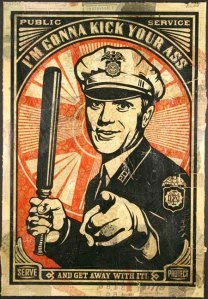My fellow avant guardian, Ari, asked a fine question in the comments to my popOp post this week and below is my response (it's the same response I've posted on the avant guardian):
This video embedded in my post got me thinking about what Hannah Arendt said, “There exists in our society a widespread fear that has nothing to do with the biblical ‘Judge not, that ye be not judged,’ and if this fear speaks in terms of ‘casting the first stone,’ it takes this word in vain. For behind the unwillingness to judge lurks the suspicion that no one is a free agent, and hence the doubt that anyone is responsible or could be expected to answer for what he has done.” (emphasis mine)
And this is precisely the point of discussing spectacular agency.
If you noticed (I didn’t until the second go round) toward the end of the clip (around the 8th minute, I think) you can clearly see the cops have a guy standing on the other side of the human wall with a video camera.
Since Rodney King it’s been very clear to folks that want to rage against the machine that having video images of brutality will work in your favor as the spectacle of violence usually communicates something rapidly (usually it’s a moral claim akin to “we’re David and they’re Goliath, Help!”) Among military circles there’s been this discussion for about ten years that the Pentagon needs to learn the lessons of “public diplomacy” and usually they’ll point-out that Al Qaeda-like networks are successful at recruiting and sustaining fighting against the largest military of all human history because they have the ability to win moral arguments using simple strategies like showing people getting killed by the outsider. Public diplomats point out that these videos are damaging because they reduce the (U.S.) mission to simple images of Goliath smothering Davids. So, they say, the Pentagon should find ways to reduce their enemy combatants to images as well.
This is why the Toronto police are armed not only with massive military force, they are also armed with mass communications force. They are out there reducing their enemies to images. Then, were a trial to be called, the police would have their images fight the images brought forward by the protesters. Thus I talk about spectacular agency: what kind of agency do you have when you’re reduced to such?
Ultimately, I believe that the frustration I feel is not that the protesters were not thinking, I suspect they thought this was a legal, non-offensive, active in my democracy-type action. They ask the riot police where they should go, they plead with them, as human beings to communicate. These people want to be compliant with the physical demands of the police and the police don’t allow that. The police, probably acting on the orders from someone not able to see what is happening in the situation, respond with beatings and arrests and detention.
The trial of Johannes Mehserle (this cop stands accused of murdering Oscar Grant III, which he claims was an accident and only meant to use his Taser on Grant, even though he clearly uses the gun in the manner he’s been trained and is completely unlike the way one fires a Taser) raises a similar issue. The law is such that if a cop feels endangered, the cop can use lethal force at their discretion. Thus it’s legally very difficult to establish whether it is excessive to shoot in the back and kill a man who is prone on his stomach, hands under his body. Legally it’s tough to establish that.
But morally it’s clear that Mehserle was wrong to do that. Even if it was the case that he meant to use his Taser, Mehserle only establishes with that fact that he is guilty of manslaughter and criminal negligence. But legally it’s unclear. I say he should be judged.
Judging, like improvisation, as you brought up, is a risk that must be taken.
Saturday, July 3, 2010
Subscribe to:
Post Comments (Atom)






I am so pleased I found this blog, I really got you by an accident, while I was searching for something else. The story and blog you have published is very interesting as well as informatics, Thanks for sharing such type of informatics thing.
ReplyDeleteHere is some useful information too
DRU Fires
Gazco Gas Fire
Zehnder Designer Radiators
Reina Designer Radiators
Bosch Home Appliances
Franke Kitchen Sinks
Neff Kitchen Appliances
Aeon Designer Radiators
Bisque Designer Radiators
Manhattan Shower Enclosures
Blanco Kitchen Appliances
Matki Bathrooms
Royce Morgan Baths
HIB Quality Bathroom Products
Hudson Reed Bathrooms
Premier Baths
Vitra Baths
Phoenix Baths
RAK Ceramics
Hansgrohe Baths
Roca Baths
Portable Cloud Storage Apps are light software versions that can be run from a USB drive without being installed on the computer. Download Portable Apps at archive-box.com
ReplyDeletePortable Apps, Cloud Storage App, Dropbox Portable App, File Manager App, Online File Manager, Online Storage App, Online Data Storage, Online Data Backup, Portable Cloud Storage App, Portable Archivebox
Thanks